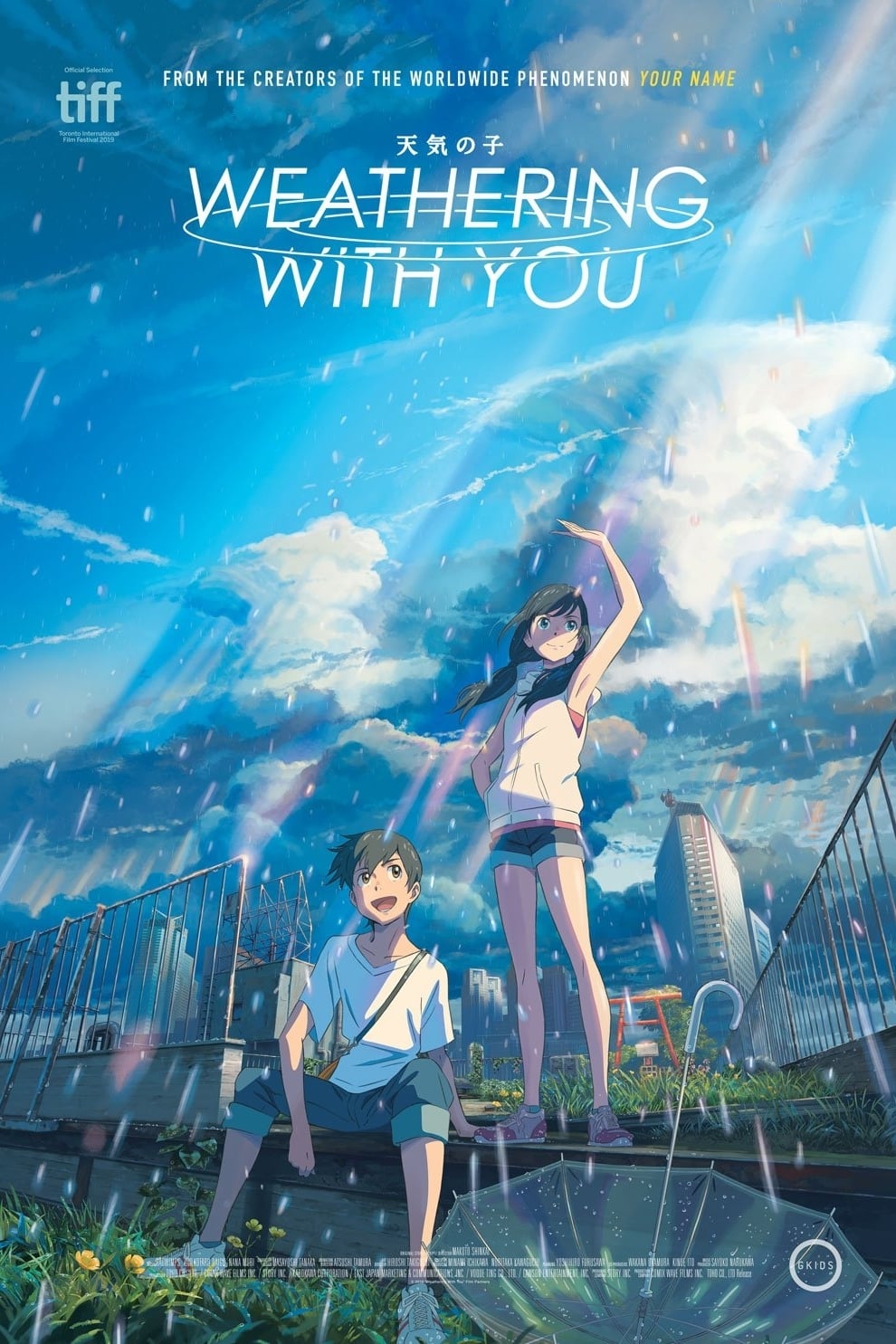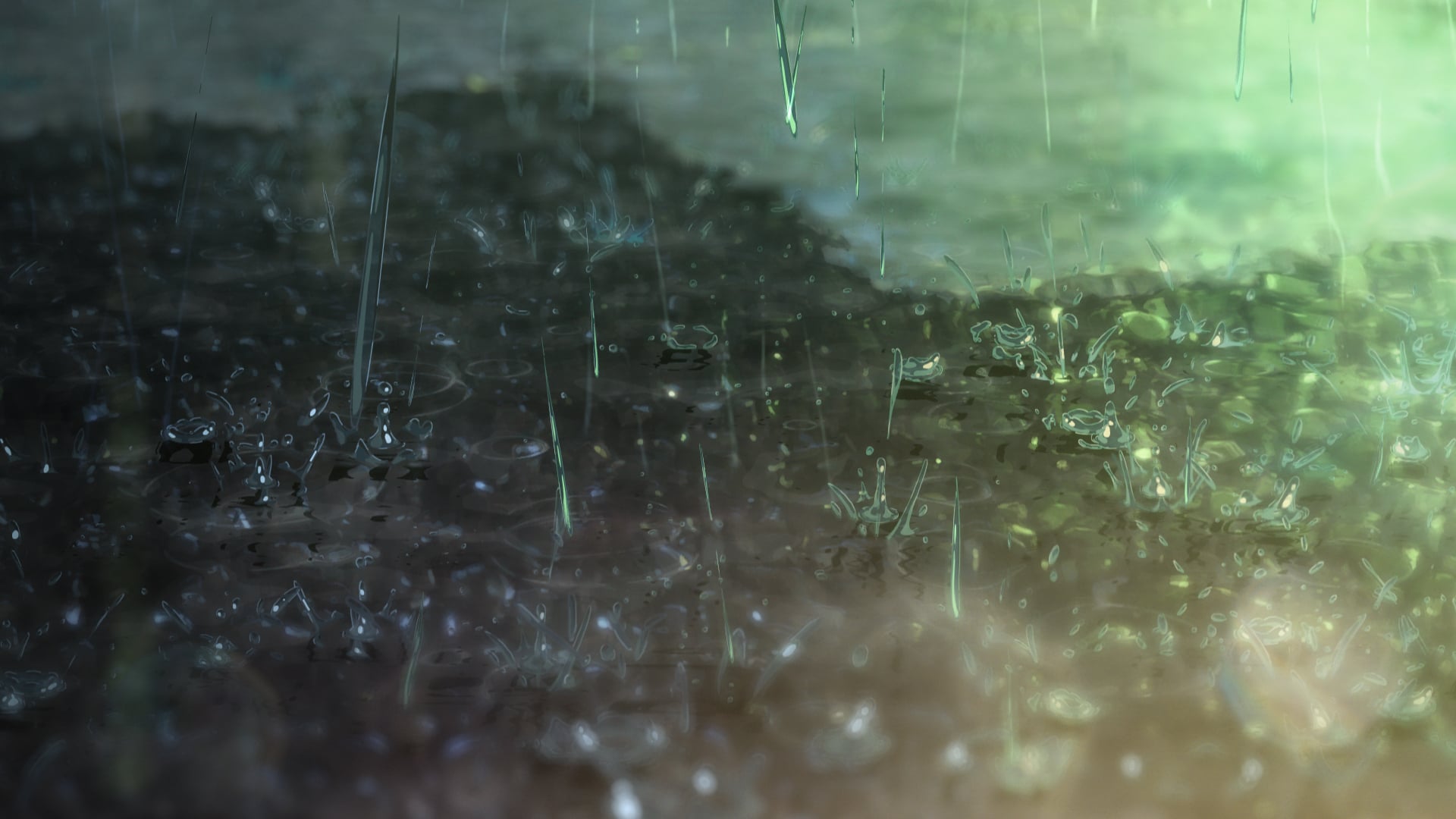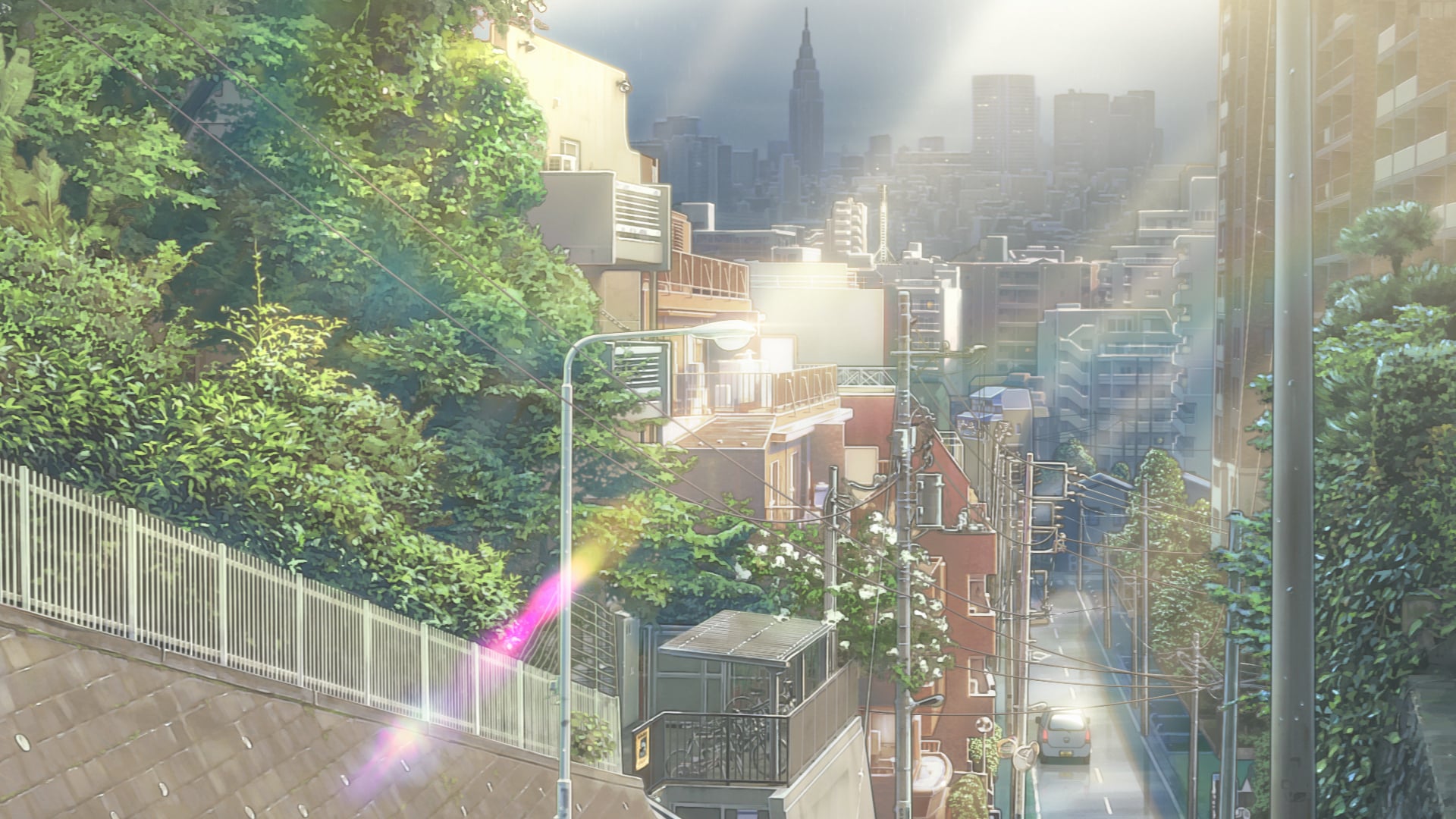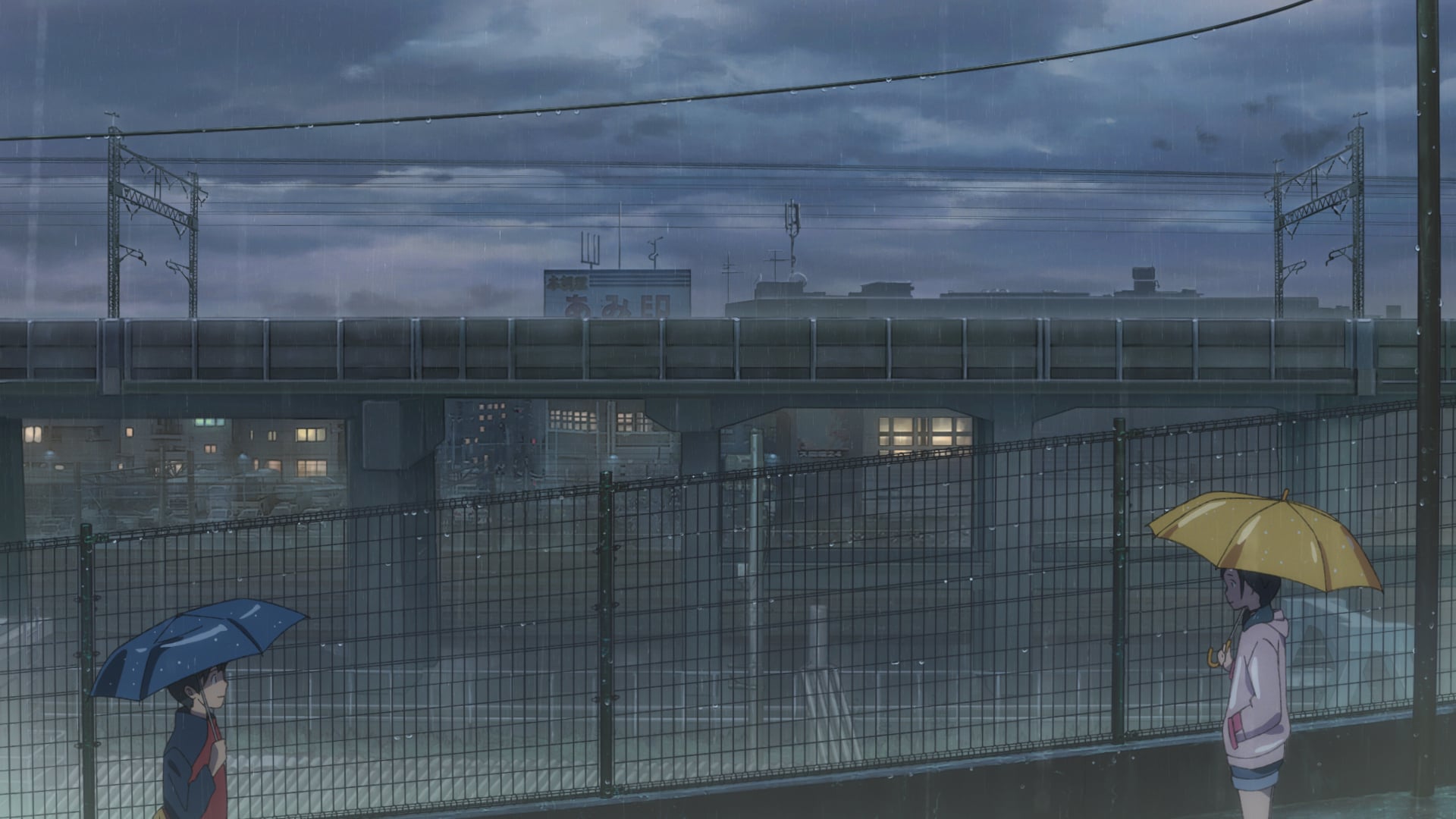By Tim
 Makoto Shinkai, the Japanese animation director whose new film Weathering with You opens this weekend in the US, has honed in on a few particular aesthetic preoccupations with laserlike intensity over the years. One of these is rain and the way that each droplet catches and reflects the diffuse light of a cloudy day; one is the brilliance of sunbeams piercing their way into shady areas, with fuzzy, dusty edges blurring the difference between light and dark; one is the way that riding in trains forces a lateral flatness onto the perception of the rider, transforming landscapes into planes of action moving across each other. He also favors stories about the extreme emotional states of teenagers, starting with but not limited to youthful romantic passion, and these stories tend to end in lopsided sentimentality expressed with as much unsatisfying contrivance as a decent filmmaker would dare throw into an otherwise satisfying screenplay.
Makoto Shinkai, the Japanese animation director whose new film Weathering with You opens this weekend in the US, has honed in on a few particular aesthetic preoccupations with laserlike intensity over the years. One of these is rain and the way that each droplet catches and reflects the diffuse light of a cloudy day; one is the brilliance of sunbeams piercing their way into shady areas, with fuzzy, dusty edges blurring the difference between light and dark; one is the way that riding in trains forces a lateral flatness onto the perception of the rider, transforming landscapes into planes of action moving across each other. He also favors stories about the extreme emotional states of teenagers, starting with but not limited to youthful romantic passion, and these stories tend to end in lopsided sentimentality expressed with as much unsatisfying contrivance as a decent filmmaker would dare throw into an otherwise satisfying screenplay.
Weathering with You, comes with a scenario that has been created with the apparent goal of specifically enabling him to chase every one of those things as far as a person possibly could. It's about a near-future Tokyo where it's always raining, and a teen girl who has the ability to create localized pockets of rainless sunshine...

She and a teen boy form a business going from place to place (by train!), carving sunlight out out of the gloom, and in the process fall in love, leading to an absolutely ludicrous finale that's as gorgeously heartfelt as it is trite.
The film has already earned the reputation that it's not as good as the director's last film, the sublime Your Name., and that's true enough. But being as good as Your Name. would be a tall order for any filmmaker, and I think Shinkai has come much, much closer than the critical consensus would have you believe. Technically, at least, Weathering with You is probably the more impressive film. When I say it's always raining in this film's Tokyo, I mean that it's always raining, and the sheer multiplicity of shots involving water, either falling from the sky or gathered in puddles, makes this one of the most impressive feats of effects animation out there.

And the film knows this. It will routinely hold on a shot of some particular visual aspect of water – how it flows, how it sparkles, how it splashes – and just let us appreciate all of its beautiful fluidity for a moment. This isn't new territory for Shinkai. His films are always first and foremost mood pieces, watching landscapes as they are worked upon by light, wind, and rain; Weathering with You is maybe the most extreme version of this, happy as it is to foreground weather as the major aspect of its story. Whatever the case, it results in a film that puts up a strong fight to be considered the most altogether beautiful animated film of 2019 – maybe the most beautiful film, period.

The story used as the pretext for this beauty is more sedate than the elaborate, psychologically complicated game of identity in Your Name. Teenager Hodaka (Kotaro Daigo or Brandon Engman, depending upon which dub you see) is a runaway from some stultifying small town, who winds up in Tokyo with nothing but hope and innocence; he ends up working for an idiosyncratic publishing house that has only two employees, owner Keisuke (Shun Oguri/Lee Pace), and reporter Natsumi (Tsubasa Honda/Alison Brie), and focuses exclusively on tabloid-esque paranormal stories. This is how Hodaka hears rumors of certain young women who can control the weather, and how he meets one such magical person, Hina (Nana Mori/Ashley Boettcher), who lives alone with her younger brother, dodging child protection services. And here the plot basically stops developing for a good solid hour, as we watch Hodaka and Hina get to know each other while the cops fumble around in the far background.
The film gets extremely peculiar in its last quarter, first shifting into an action-heavy chase scene before shifting again into inscrutable metaphysics. And then, at last, it ends in pure sentimentality, so devoted to the emotional story it's telling that it completely abandons anything else (most notably, the suggestion in the film's early going that this will be a fable about climate change is done away with entirely in the climax, which cares about the weather solely as a thing that either puts you in a good or bad mood). It's a little cloying: in either Japanese or English, some of the protestations of love are overripe to the point of kitsch. But it's so nakedly sincere that it's hard to feel bad about it. This is a big-hearted, sloppy film, just like Your Name. and every other one of this filmmaker's projects; tidying it up would possibly make it more satisfying as a story, and would maybe give it some sort of coherent meaning beyond "ah, teen romance!", but it would surely rob it of some of its rich melodrama as well.

Besides, no matter how clunky the plot gets, and how shrill the sentiment, this is never anything but a breathtakingly lovely film. The explosions of color within the general scheme of grey, or the roving camera movements through lovingly-detailed spaces in Tokyo, or especially the blissed-out adoration of sunlight and the way it interacts with different objects, are overwhelming, spectacular but also so emotionally resonant that theY feel delicate and intimate. This is the best anime film imported to the United States in 2019, and while that turns out not to be enough to have won the film an Oscar nomination, this is still a tremendous work by a major artist.